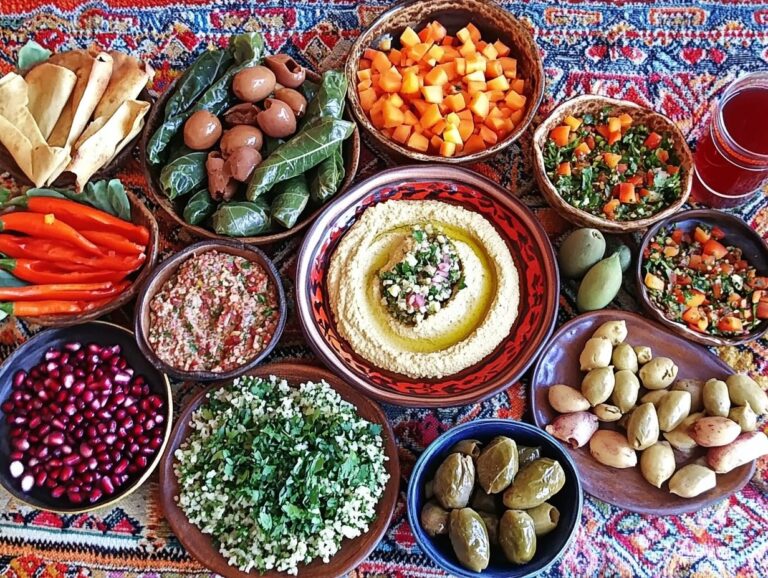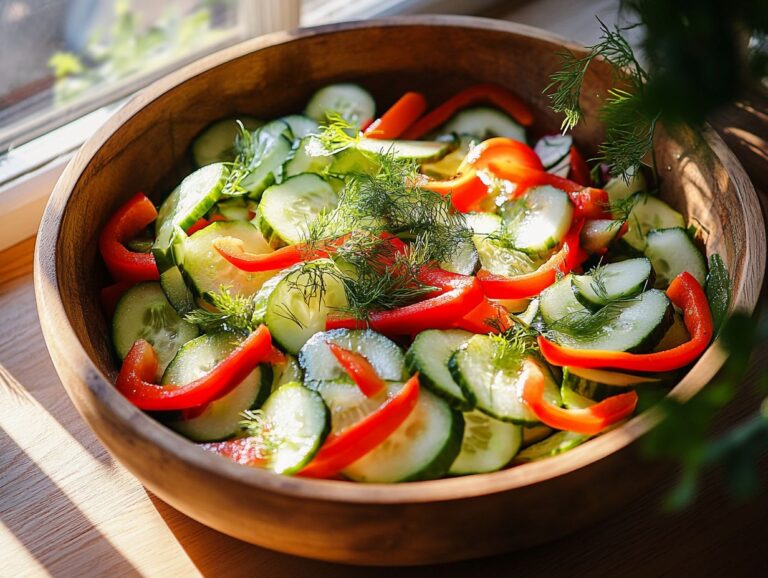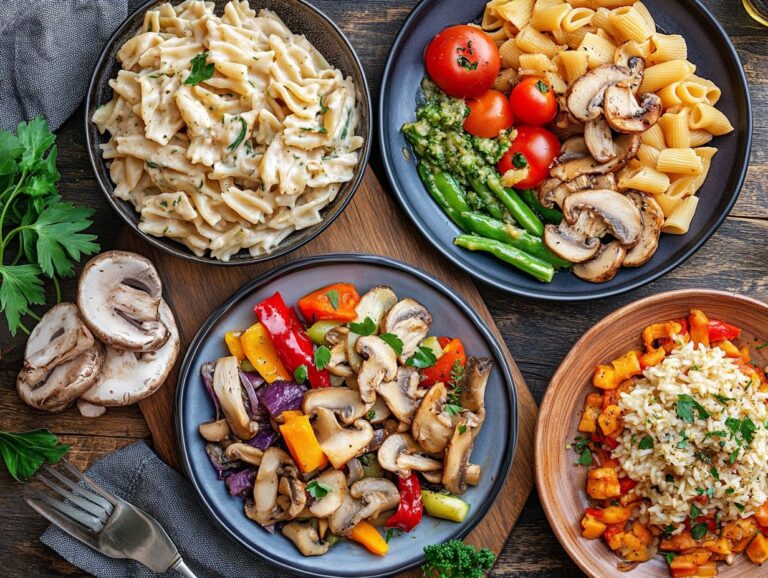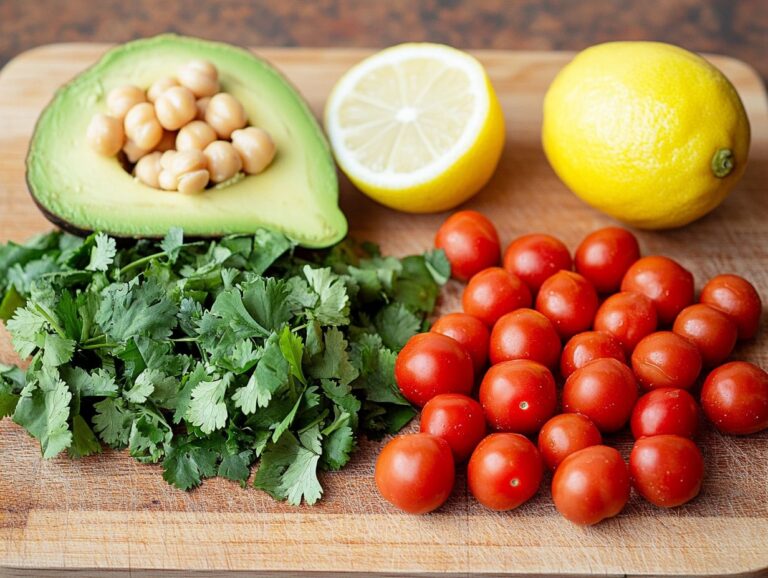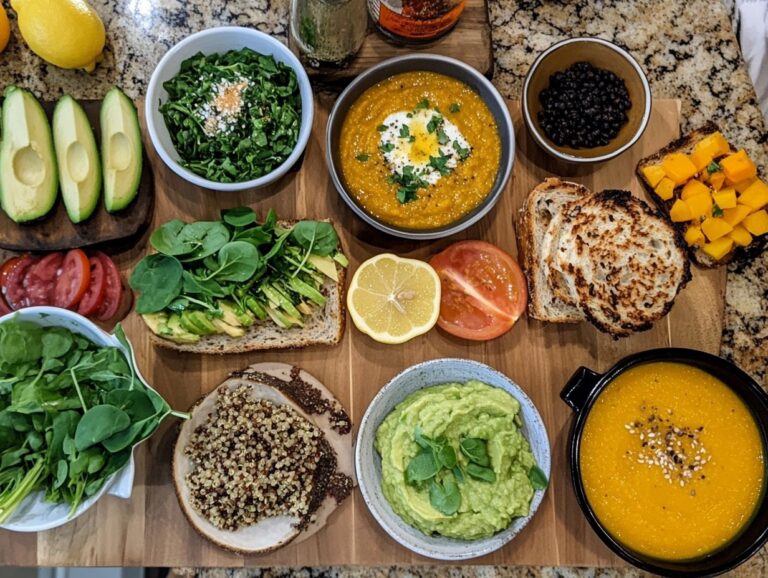Acid reflux is a bothersome and uncomfortable condition that can significantly impact a person’s daily life and eating habits. Understanding the causes and symptoms of acid reflux is essential for effective management. This article explores how a vegan diet may aid in the treatment of acid reflux, thanks to its plant-based benefits. It includes various vegan recipes for breakfast, lunch, dinner, snacks, and desserts, along with helpful tips for incorporating vegan meals into your diet and other natural remedies to promote overall wellness.
Understanding Acid Reflux
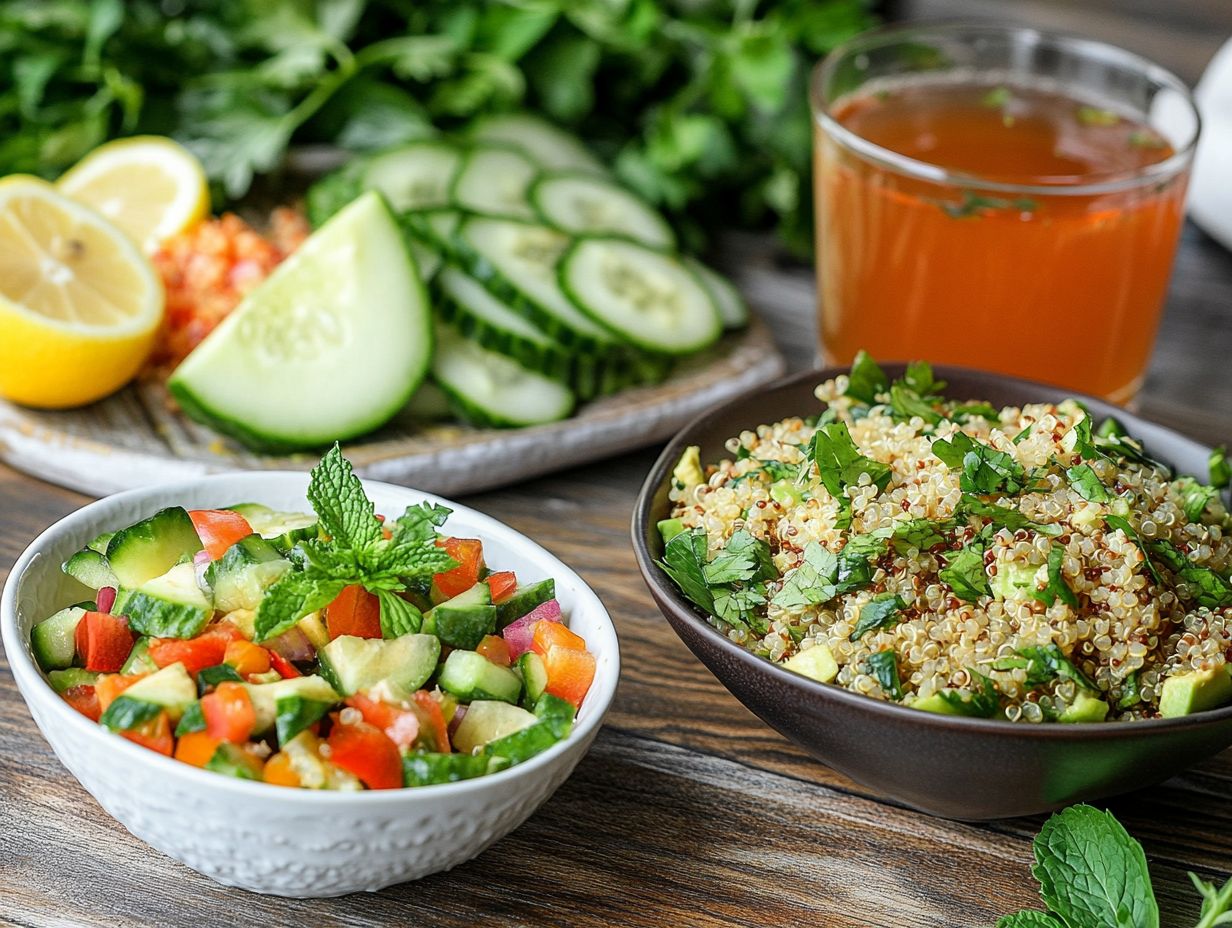
Acid reflux, also known as gastroesophageal reflux disease (GERD), is a prevalent digestive disorder characterized by the backward flow of stomach acid into the esophagus. This condition often results in uncomfortable symptoms such as heartburn, regurgitation, and difficulty swallowing, which can significantly affect an individual’s quality of life. Acid reflux is often linked to other digestive issues like gastritis and can be exacerbated by food intolerances and dietary habits.
Understanding acid reflux is crucial for effective management and prevention, especially for those with food sensitivities or intolerances. A holistic approach to digestive health, which includes proper hydration, can help alleviate symptoms.
In this guide, we will explore the underlying causes, symptoms, and potential implications of acid reflux while emphasizing a holistic approach to digestive health.
Causes and Symptoms
Acid reflux has multifactorial causes that encompass lifestyle choices, dietary habits, and medical conditions affecting the digestive tract. Common triggers include overeating, consuming spicy foods, and eating high-fat meals, all of which can increase pressure on the lower esophageal sphincter. Eating a diet high in alkaline foods and practicing portion control can be beneficial.
Symptoms of acid reflux can vary but often manifest as persistent heartburn, regurgitation, and throat irritation, negatively impacting overall digestive health. Identifying food allergies and avoiding specific food combinations can also be helpful in managing symptoms.
Identifying specific food intolerances and practicing portion control can be crucial in managing these symptoms. It is essential to recognize that certain foods may exacerbate the condition, making it important to observe how individual dietary choices affect symptoms.
Common culprits include:
- Citrus fruits
- Chocolate
- Caffeine
- Alcohol
These may provoke discomfort and suggest that a tailored diet could help mitigate the effects of acid reflux. Implementing preventive measures such as staying upright after meals, avoiding large portions, and opting for a balanced diet rich in whole grains, vegetables, legumes, and lean proteins can significantly enhance digestive health.
By adopting these strategies, individuals can reduce the frequency and intensity of acid reflux episodes, thereby improving their overall well-being.
Benefits of a Vegan Diet for Acid Reflux
A vegan diet can be beneficial for managing acid reflux due to its plant-based nature, which naturally includes low-acid foods and anti-inflammatory ingredients that support digestive health.
The cornerstone of a vegan diet consists of whole foods such as fruits, vegetables, legumes, and whole grains, all of which provide essential nourishment while reducing the likelihood of reflux symptoms.
Additionally, vegan diets are typically high in fiber, which aids digestion and promotes the growth of healthy gut flora, both of which can alleviate acid reflux symptoms.
Furthermore, the same ingredients that enhance digestive health in a vegan diet are also advantageous for overall well-being, which is often a consideration for individuals looking to change their eating habits.
How a Plant-Based Diet Can Help
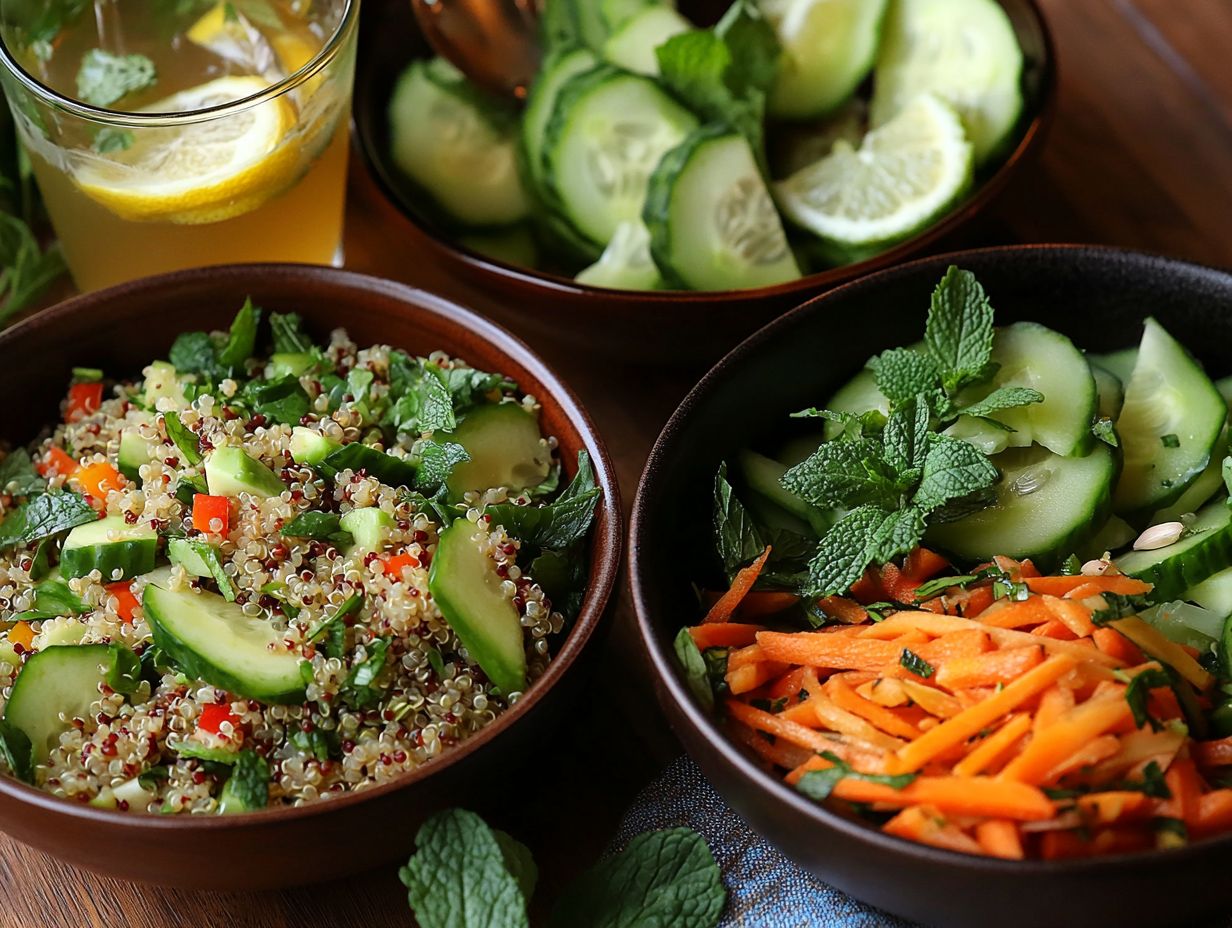
A plant-based diet can significantly improve digestive health, particularly for those who experience acid reflux, by incorporating more alkalizing foods and ingredients that are high in fiber. Individuals should include pH-neutral foods in their diets, such as vegetables, fruits, whole grains, nuts, legumes, and plant proteins, to provide essential nutrients and help maintain a neutral pH in the stomach.
This dietary approach minimizes the intake of trigger foods while offering gut-friendly options like oatmeal, quinoa, sweet potatoes, and boiled or steamed vegetables, which may alleviate symptoms and enhance overall comfort.
Along with these staples, incorporating easy-to-digest, potassium-rich foods like avocados and bananas can be beneficial. Meals such as quinoa salad with roasted vegetables or creamy avocado pasta can satisfy digestion-friendly cravings. Herbal teas, such as chamomile or ginger, can further soothe the digestive tract.
Focusing on whole plant foods provides a rich source of antioxidants and anti-inflammatory properties, promoting good gut health and reducing the frequency of reflux episodes. Thoughtful selection of plant-based options can lead to significant improvements in managing acid reflux.
Vegan Recipes for Acid Reflux Relief
Vegan recipes designed to relieve acid reflux incorporate low-acid foods that are both soothing and nutrient-dense, ensuring that meals are satisfying while promoting health. By including recipes for reflux that focus on whole foods, individuals can further enhance their digestive health.
By utilizing whole foods such as leafy greens, oatmeal, and legumes, individuals can prepare a variety of delicious vegan dishes that support digestive wellness. Meal preparation is essential for maintaining a consistent diet and simplifies the inclusion of gut-soothing ingredients in daily meals.
The following sections will explore recipes for breakfast, lunch, dinner, snacks, and desserts for those looking to alleviate acid reflux.
Breakfast Recipes
Vegan breakfast recipes that help relieve acid reflux should focus on low-acid options and fiber-rich ingredients, providing a nutritious start to the day.
Oatmeal topped with nuts and seeds, as well as smoothies made with leafy greens and fruits, are excellent choices that promote digestive health. Smoothie recipes incorporating ingredients like avocado, pear, and banana can be particularly beneficial. These meals not only satisfy hunger but also deliver essential nutrients to prevent stomach irritation, making them ideal for those managing acid reflux.
Quinoa porridge is another great option; it is a rich source of protein and fiber, serving as a delicious base that can be flavored with cinnamon or sliced bananas without increasing acidity. Incorporating non-dairy options like almond milk can also make these recipes suitable for those with dietary restrictions.
Chia seed pudding made with almond milk is also an excellent choice, adding omega-3 fatty acids and additional fiber. Incorporating avocados, which are low-acid and packed with healthy fats, into these breakfast ideas can create a well-balanced, filling meal that supports overall digestive health. Additionally, including gluten-free options can further accommodate those with food sensitivities.
Lunch and Dinner Recipes
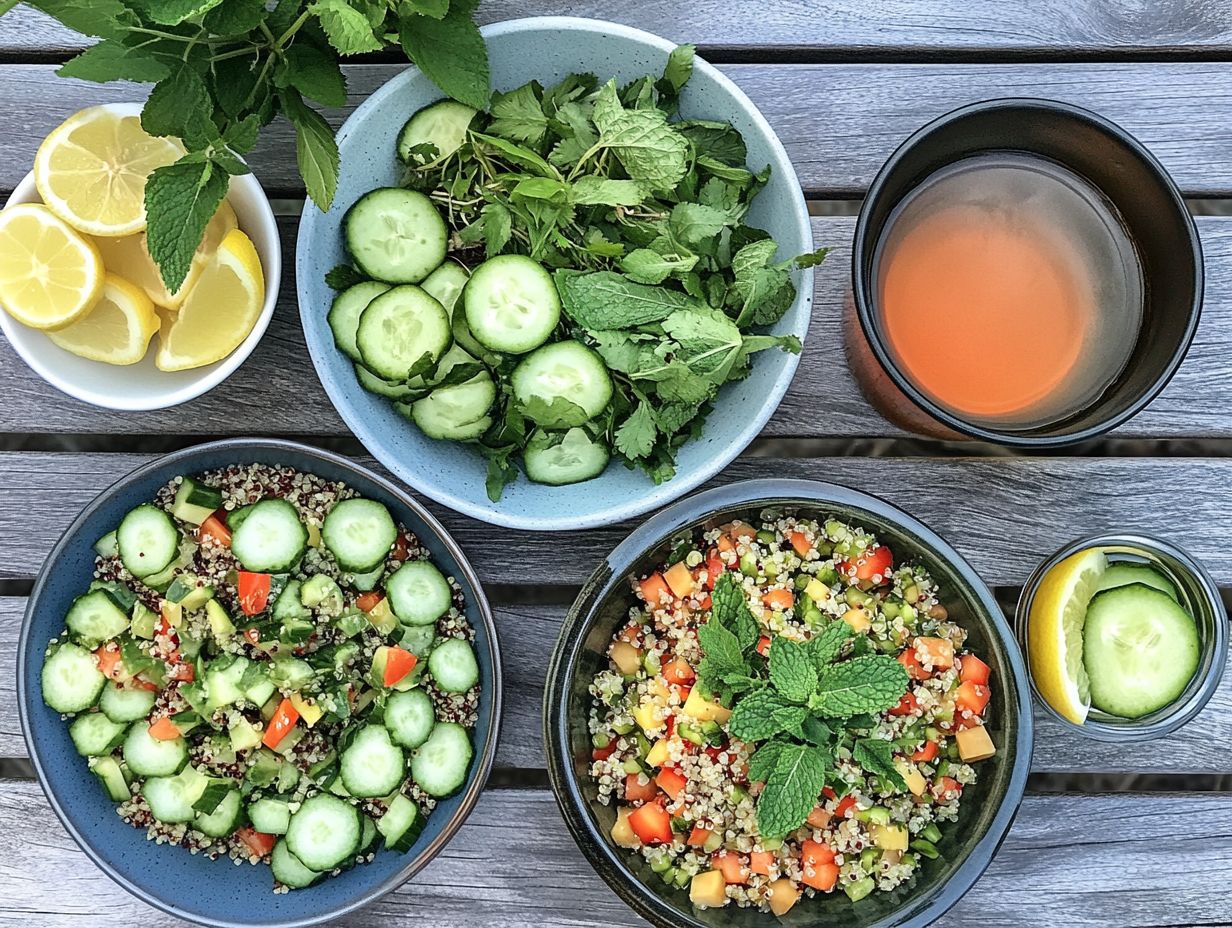
For lunch and dinner, vegan recipes should be diverse and balanced, taking into account triggers for acid reflux while emphasizing whole foods and low-fat options.
Dishes such as quinoa salads, stir-fried vegetables, and grain bowls featuring anti-inflammatory ingredients ensure that meals are both satisfying and nutritious. Salad recipes with wholesome ingredients like zucchini, chickpeas, and leafy greens can provide nutrient-rich options. Focusing on meal diversity not only keeps the palate engaged but also supports digestive health by incorporating a range of flavors and textures.
Herbs and spices can enhance the dining experience by adding complexity without being overwhelming. Using culinary herbs like ginger, fennel, and chamomile can add soothing properties to meals. Simple preparations like roasted chickpeas or sautéed greens can serve as delightful side dishes, introducing a variety of tastes that highlight the natural flavors of the main ingredients.
Additionally, cooking methods such as steaming or lightly grilling help preserve essential nutrients while keeping meals light and enjoyable. This thoughtful combination not only provides energy but also fosters a connection to whole foods. Incorporating cooking techniques like baking, roasting, and sautéing can also diversify meal preparation.
Snack and Dessert Recipes
Vegan snacks and dessert recipes that are both satisfying and acid reflux-friendly are crafted with gut-friendly ingredients and calming foods that soothe the digestive system.
Options such as energy bites made with nuts and seeds, as well as citrus-free desserts made with bananas and apples, offer delicious alternatives that satisfy cravings without exacerbating reflux symptoms. Choosing healthy snacks not only allows for adequate energy intake but also promotes overall digestive health. Including low-sodium options and mindful eating practices can further enhance these benefits.
Incorporating ingredients like oats, which are gentle on the stomach, and coconut yogurt, rich in probiotics, can provide additional digestive benefits. Tofu and tempeh can also be added for vegan protein options.
For those looking to satisfy their sweet cravings, chia seed puddings are soothing options, while creamy avocado chocolates are free from irritants. Natural sweeteners like maple syrup or agave add a touch of sweetness without the harshness associated with refined sugars. Herbal teas like lemon balm and slippery elm can further soothe digestive discomfort.
By focusing on gut-nurturing ingredients, these recipes not only address cravings but also contribute to achieving balance and wellness.
Tips for Incorporating Vegan Meals into Your Diet
Vegan meal planning is essential for effectively incorporating vegan meals into one’s diet, maximizing nutritional benefits, taste, and overall health advantages. Meal prep and mindful eating are key strategies for successful dietary transitions.
Cooking methods such as steaming, baking, and sautéing can help create diverse meals while preserving the benefits of whole foods. By selecting appropriate substitutes for various ingredients, such as using vegetable broth for flavoring or nutritional yeast for added nutrients, individuals can accommodate personal preferences and dietary requirements, further enhancing the overall benefits of a vegan diet.
Meal Planning and Shopping Strategies
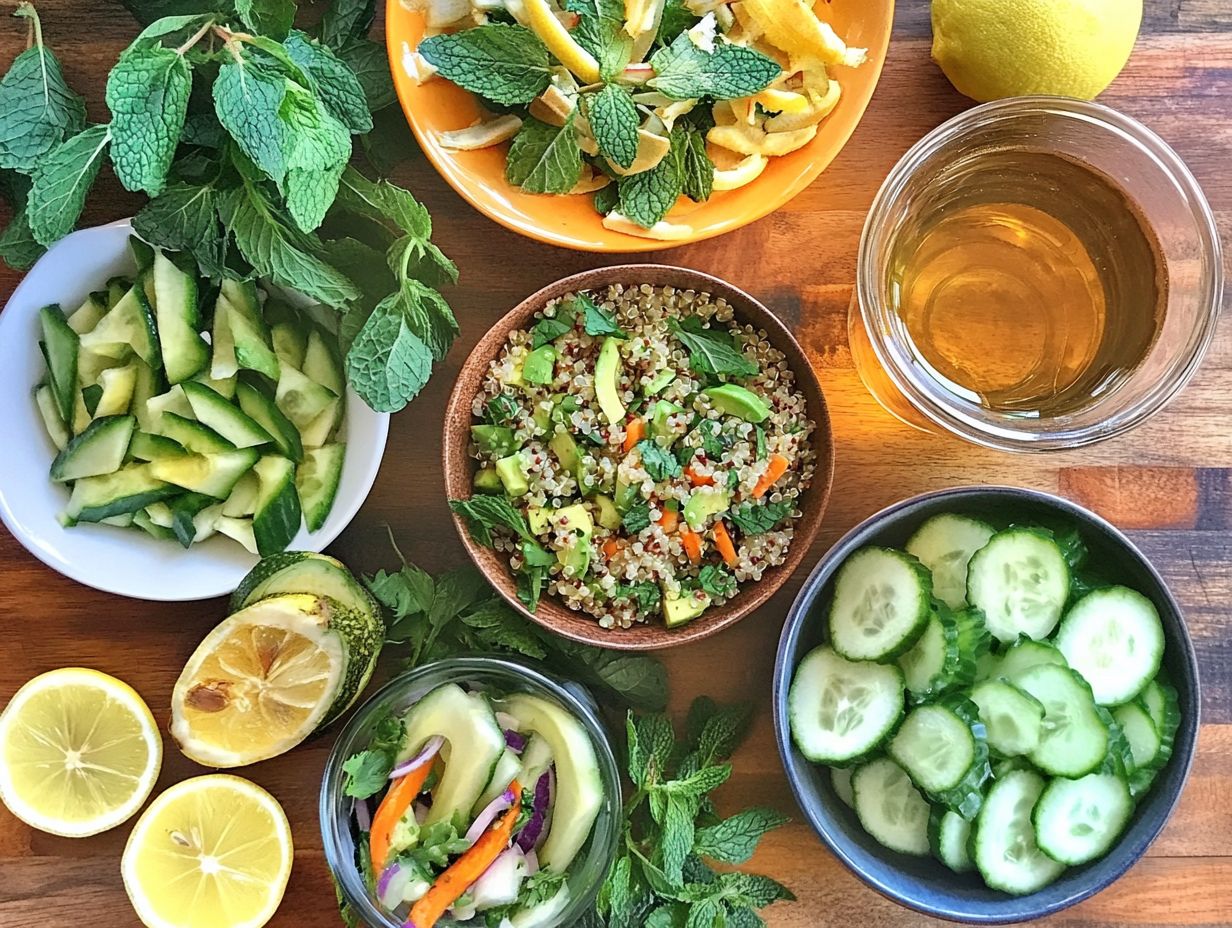
Meal planning and shopping strategies are effective tools for successfully adopting a vegan lifestyle. Having healthy foods readily available makes it easier to prepare nutritious meals.
Keeping a food diary can be helpful for tracking eating frequency, variety, food sensitivities, and other dietary factors, allowing individuals to adjust their choices as needed. Monitoring portion sizes and practicing portion control is particularly important for those with acid reflux, as it helps prevent overeating and ensures adequate time for digestion between meals. Incorporating tips and techniques for mindful eating can further support digestive health.
While there are many components and options to consider, balanced nutrition in a vegan diet typically includes a variety of plant-based protein sources, grains, and vegetables. Incorporating holistic nutrition principles and focusing on anti-inflammatory and nutrient-rich foods can enhance overall wellness.
Creating a weekly meal plan simplifies grocery shopping, ensures the selection of fresh, seasonal produce, and limits impulse purchases. Batch cooking not only saves time but also facilitates portioning meals, storing them effectively, and reducing food waste. Including a variety of fruits, vegetables, whole grains, and legumes in your meal ideas can enhance dietary diversity and boost nutrient intake.
When individuals need to carve out time from a busy schedule to prepare a meal, having ready-to-heat options makes maintaining a vegan lifestyle much more manageable. Incorporating meal prep strategies, such as portion control and using non-dairy ingredients like almond milk and nutritional yeast, can make vegan meal planning both convenient and delicious.
Thoughtful meal planning ensures that individuals enjoy a variety of satisfying choices while also making it easier to meet other goals such as convenience, taste, and sustainability. By including high-fiber foods like oatmeal, quinoa, and brown rice, and low-acid options like bananas, pears, and zucchini, you can create meal plans that support digestive health and alleviate symptoms of acid reflux and GERD.
Substituting Ingredients for Vegan Options: Recipes and Tips
Substituting ingredients for vegan options can transform traditional recipes while ensuring both health benefits and flavor retention, making it easier to adapt meals to various dietary preferences, including those with dietary restrictions like food allergies and gluten intolerance.
Common substitutions, such as using plant-based protein sources like tofu, tempeh, and legumes in place of meat and nut-based milks like almond milk instead of dairy, allow for culinary creativity without sacrificing taste.
By exploring different cooking techniques and flavor enhancers, individuals can enjoy satisfying meals that align with their health goals. For example, incorporating legumes like lentils or chickpeas not only boosts protein content but also introduces a rich texture and earthy flavor to dishes. Techniques such as steaming, baking, and grilling can maximize the retention of essential nutrients in ingredients like leafy greens, sweet potatoes, and avocado.
Effectively utilizing spices and culinary herbs can elevate flavors, turning simple vegetables into gourmet creations. Techniques such as roasting, sautéing, or grilling can develop layers of taste while retaining vital nutrients. For those seeking heartburn relief, incorporating low-acid and anti-inflammatory spices like ginger and turmeric can add both health benefits and delicious flavors.
Additionally, using nutritional yeast adds a cheesy, umami flavor that enhances a variety of dishes, from pasta to pizzas, making it a valuable addition for those embracing a vegan lifestyle. Nutritional yeast is also a nutrient-rich ingredient, providing essential nutrients such as B-vitamins and protein.
These substitutions not only improve meal satisfaction but also promote overall well-being by encouraging a diverse intake of essential vitamins and minerals, supporting gut health, and reducing the risk of chronic conditions like gastritis and inflammation.
Other Natural Remedies for Acid Reflux and GERD
Other natural remedies for acid reflux can enhance the effectiveness of dietary changes by offering additional options for symptom relief and promoting digestive health. Incorporating alkaline foods and low-fat, low-sodium meal options can further help manage symptoms effectively.
Herbal remedies, such as ginger, slippery elm, fennel, and chamomile, possess soothing properties that can alleviate acid reflux symptoms. Additionally, adopting lifestyle habits like proper hydration and mindful eating can further assist in managing reflux symptoms. Herbal teas, including those made from lemon balm and chamomile, can be soothing foods that promote digestive health.
Herbs, Supplements, and Lifestyle Changes
The use of herbs, supplements, and lifestyle changes can effectively treat the symptoms of acid reflux while improving digestion and overall well-being.
By combining these natural treatments with other strategies mentioned earlier, you can develop an effective plan. For instance, maintaining a healthy diet that includes a variety of fruits, vegetables, whole grains, and legumes is associated with better digestive health and reduced inflammation. Including nutrient-rich, fiber-rich foods like smoothie recipes and salad recipes in your meal rotation can support gut health and alleviate symptoms of acid reflux and GERD.
Additionally, managing stress through practices like yoga and meditation can significantly alleviate symptoms, as high-stress levels tend to worsen acid reflux.
Staying hydrated and avoiding trigger foods, such as spicy dishes and highly acidic fruits, can also help individuals manage their reflux issues more effectively. This holistic approach offers a comprehensive pathway to achieving long-term relief. Exploring gluten-free, citrus-free, and low-acid recipes for reflux, along with low-fat and wholesome meal options, can contribute to better overall well-being and effective symptom management.
